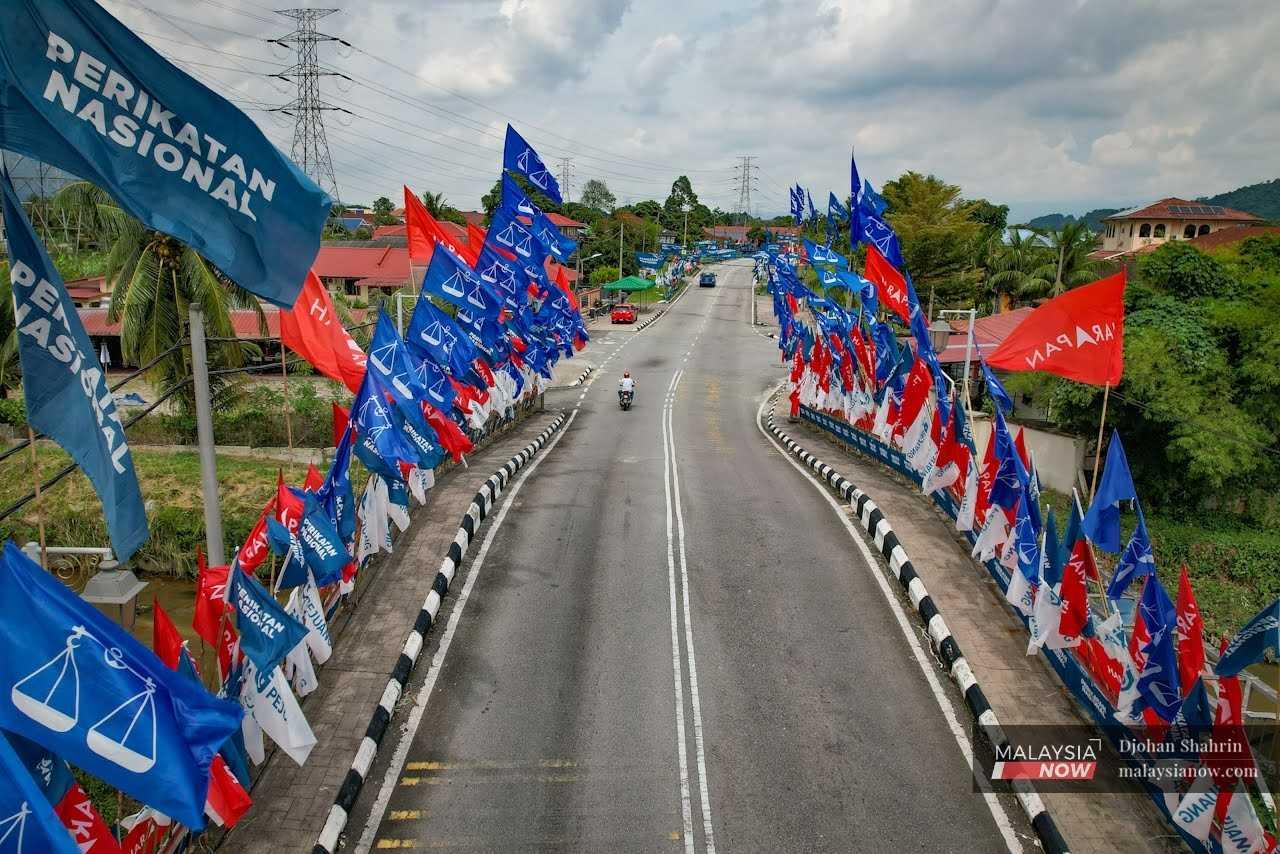In Kuala Kubu Baharu, support from 'the other side' a distant dream for PN, PH
The two opposing coalitions are capitalising on their weakest components – Amanah and Gerakan – in their bid to win Malay and non-Malay votes respectively.
Just In
While Perikatan Nasional (PN) remains popular among Malay voters more than a year after missing the chance to lead the federal government, the coalition is still hoping for the support of non-Malays, who could ensure its victory in seats where Malays do not form an overwhelming majority.
This includes Kuala Kubu Baharu, the state seat in Selangor where PN will face Pakatan Harapan (PH) in a by-election next month.
There, Malays make up around 47% of the electorate.
PN, often labelled a "right-wing" Malay party, has acknowledged the importance of gaining non-Malay support.
In the Kuala Kubu Baharu by-election, it is expected to focus on Malay areas such as Bandar Utama Batang Kali, Ampang Pecah and Batu 30.
"But we will not abandon the 18% Indian voters and 33% Chinese voters," said Hasnizan Mohd Harun, PN's deputy election director for the upcoming polls.
"We want to gauge the level of non-Malay support for PN in this by-election," the Hulu Selangor MP, who is also the Selangor PAS treasurer, told MalaysiaNow.
Hasnizan said although Malay voters form the majority in Kuala Kubu Baharu, they are more divided than the non-Malays who form a unified bloc.
PN is targeting an 85% turnout of Malay voters, more than the 70% goal set at last year's state election.
Weak components
While PN is struggling to win the support of non-Malays who have supported DAP for more than a decade, PH is fighting for acceptance by the Malays, many of whom switched their allegiance to PN after the last general election.

In Kuala Kubu Baharu, the burden of winning Malay support for PH has been placed on Amanah, a party that is still largely dependent on non-Malay voters.
Amanah said it had its own "strategy" to achieve this.
"By mobilising the entire machinery of the parties in the unity government and promoting the trend of peace, tranquility and harmony that the unity government has brought, I am confident that the people will maintain this trend in the upcoming by-election," Dzulkefly Ahmad, the party's strategic director, was quoted as saying.
But if PH is relying on its relatively weak component to shoulder this task, so too is PN, which has given the job of winning over the non-Malays to Gerakan.
And PN's efforts to present Gerakan as the non-Malay part of the coalition have yet to bear fruit.
Analyst Oh Ei Sun said it would take "a lot of luck" for PN and PH to win over their targeted voters.
He does not believe that the Chinese will buck the trend by voting for PN any time soon.
However, he acknowledged the possibility that PH supporters would refrain from voting, to show their displeasure with the coalition.
"Most Chinese continue to be bothered by what they perceive as discrimination despite PH being a supposedly reformist government," Oh told MalaysiaNow.
In last year's elections, Gerakan won only one of the 36 seats it contested.
PN chairman Muhyiddin Yassin does not deny that his coalition has failed to win the support of the non-Malays.
"We have to find ways to win the support of the Chinese, Indians and other communities," he said at a convention for PN elected representatives last month.
The May 11 by-election in Kuala Kubu Baharu was triggered by the death of PH incumbent Lee Kee Hiong.
While the larger parliamentary seat of Hulu Selangor went to PN in the last general election, PH was able to hold Kuala Kubu Baharu with a majority of 4,119 votes.
Chinese complaints
A PH defeat in this seat would have major implications for the coalition government as
it struggles with issues such as its plan to remove fuel subsidies, and the controversy over the royal pardon for Najib Razak.
A recent statement by Housing and Local Government Minister Nga Kor Ming also caused a stir, after he justified the sudden announcement of RM5 million in government projects for the area by citing "feng shui" – the Chinese custom of finding good fortune in one's surroundings.
"It’s not just because of the by-election in Kuala Kubu Baharu. We chose this area because it is an auspicious place. The feng shui here is 'ong' (good). So the first visit must be to a place of luck," Nga said in a statement on April 18.
This drew a sharp response from Muar MP Syed Saddiq Syed Abdul Rahman, who asked if the feng shui in his constituency was so bad that it was being left out of the allocation of public funds.
Meanwhile, Hasnizan said Chinese residents in Kuala Kubu Baharu had many grievances, including the increase in taxes and the introduction of the e-invoice system by the Inland Revenue Board.
"Many of them are traders and are not happy about the increase in sales and service tax from 6% to 8%.
"Small traders are also against the e-invoice system to be implemented by the government in a few months," he said.
He also said that the case of Deputy Prime Minister Ahmad Zahid Hamidi, whose 47 criminal charges were controversially dismissed, had further fuelled the Chinese community's discontent with the government.
Subscribe to our newsletter
To be updated with all the latest news and analyses daily.
Most Read
No articles found.



